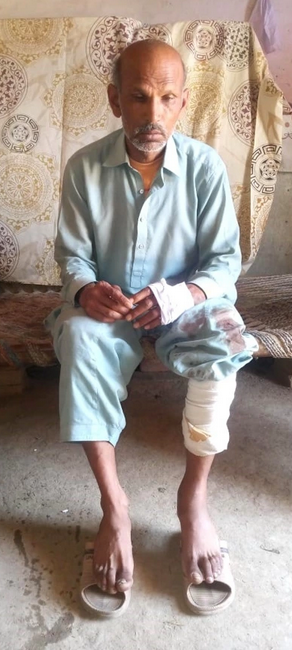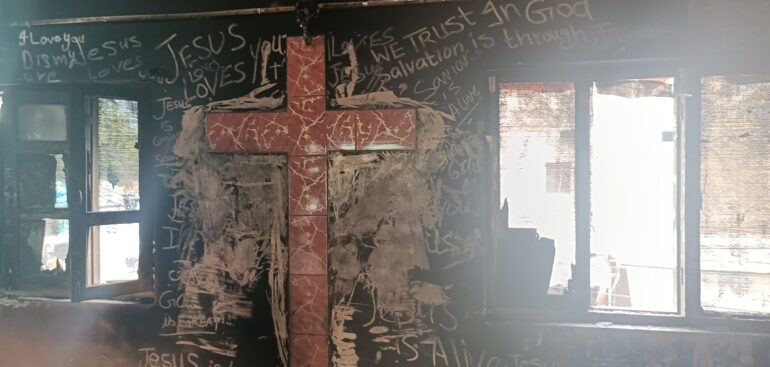Authorities in Pakistan have reportedly failed to apprehend individuals involved in assaulting a Catholic family and appropriating their agricultural land, with allegations also surfacing of police damaging property, according to sources.
Shahnaz Yousaf, a resident of Chak 694/36 GB village in the Toba Tek Singh District of Punjab Province, reported that on April 16, her family was besieged by a group of armed Muslims, purportedly orchestrated by local landlords Atif Ali, Khawar Ali, and Baber Ali, while they were harvesting their wheat.
Shahnaz’s father, Yousaf Masih, had legally leased the 10.6-acre land from the government in 1989. Over the years, the family devoted significant financial and physical effort to cultivating the land. According to Shahnaz, this success bred envy among some local Muslims, leading them to conspire to strip the family of their means of sustenance.
The land represented the sole means of survival for the family, yet financial challenges prevented them from meeting lease payments for several years. In March 2023, a directive from a senior revenue official stipulated that the family needed to secure 3.5 million rupees (approximately US$13,000) to maintain their claim on the land—requiring an immediate payment of 2.1 million rupees (US$7,300) and the balance through installments, Shahnaz recounted.
“Despite the daunting task of raising such a significant sum on short notice, we liquidated all our valuable assets to meet the deadline,” Yousaf expressed.
For a time, peace prevailed, until November when the family discovered that local landlords had allegedly influenced the local assistant commissioner to list their land for auction. In response, the family sought legal recourse, obtaining a preliminary injunction from the Lahore High Court to halt the auction proceedings.
“Despite a judicial directive safeguarding our rights, the assistant commissioner illicitly transferred the lease to Atif Ali, the son of Babar Ali,” Yousaf disclosed. The family was blindsided by this clandestine deal when law enforcement and revenue officials descended upon their farm, demolishing the fodder painstakingly cultivated for their livestock. “We implored them to desist and presented the court’s order, but our pleas fell on deaf ears,” she lamented.
Compelled by these circumstances, the family lodged a formal grievance with the commissioner’s office that day, resulting in a temporary allowance for them to continue farming the land.

“Throughout this ordeal, we faced relentless intimidation and threats from police and the landlords’ enforcers, pressuring us to abandon our land,” Yousaf continued. This harassment escalated alarmingly when, on February 6, just days before the general elections, her brother, Ashraf Yousaf, was explicitly threatened by members of the Muslim community.
In an emotional recounting, Shahnaz Yousaf, through tears, described a harrowing incident: “Upon reporting the threats to the police helpline, we were appalled when the responding officers, rather than apprehending the accused, raided our home and vandalized our belongings,” she said. “I was then taken to the police station and held in unlawful detention for over two hours.”
Shahnaz revealed that the police conditioned her release on her brothers’ agreement to relinquish the land.
“Thankfully, I was released after the village headman advocated for us,” she recounted.
Ashraf Yousaf, further detailing their plight, shared, “The aggressors not only continued their intimidation but also fabricated legal charges against us and sabotaged our crops.” He added, “Having devoted ourselves solely to farming and avoiding conflicts, we find ourselves painfully unversed in legal affairs. These recent events have painfully underscored our perceived inequality before the law.”
Ashraf Yousaf recounted a harrowing episode on April 16 while working in the fields. “Groups of armed men, wielding firearms, batons, and other weapons, and even bringing a wheat-harvesting machine, descended upon us,” he said.
The situation quickly escalated as he attempted to halt their advance by citing a court-issued stay order. “They violently assaulted me with their guns and batons,” Ashraf Yousaf disclosed. “Upon hearing the disturbance, my two brothers and sisters rushed to my aid, only to be brutally attacked themselves, resulting in multiple fractures and other injuries among us.”
The attackers further escalated the violence by seizing his sister’s mobile phone while she attempted to document the assault and tearing her clothes.
“The assailants fled just before the arrival of the police, who advised us to seek medical attention for our injuries and then proceed to the police station to attempt a resolution with the other party,” he added, outlining the aftermath of the ordeal.
Ashraf Yousaf conveyed the ongoing plight with a tone of deep frustration and helplessness. “While we sought medical treatment in town, the attackers returned to our fields, harvested our wheat crop, and stole the entire produce,” he recounted.
Upon reporting these events at the police station, the response was disheartening. “The duty officer dismissed our complaint outright, suggesting that our difficulties would only cease if we acquiesced to the demands of the Muslim landowners,” Ashraf explained.
The family encountered additional barriers in securing their medical-legal reports from the local government hospital, further complicating their struggle for justice. “Navigating the system felt like a relentless battle against a tide of institutional indifference,” he lamented. “After exhaustive efforts and persistent pleading, we obtained our medical reports, yet the police procrastinated for 10 days before filing our First Information Report on April 25. Even then, they took no steps to apprehend the culprits.”
Four days after their harrowing ordeal, Ashraf Yousaf shared a further setback: the opposing party had lodged a spurious legal claim against them. “They accused us of injuring someone, which is entirely fabricated,” he stated.
He expressed the gravity of their situation with a tone of profound despair. “We have lost everything—our livelihood, our financial resources, and most grievously, our hope for justice,” Ashraf lamented. “The financial burden is crushing us, as we are now forced to divert our remaining funds towards treating our injuries.”
In a bid for relief, the family has reached out to higher authorities. “We have appealed to the Chief Minister of Punjab, senior police officials, and Christian leaders, seeking their intervention to rectify the injustices we face,” he explained.
Concluding with a plea for support, Ashraf voiced their sense of abandonment: “We are powerless and vulnerable, yet, rather than receiving support, we find the local police aligning with the influential perpetrators. In these dire times, we are in desperate need of advocacy and aid from our Christian community, as they are our last recourse.”
